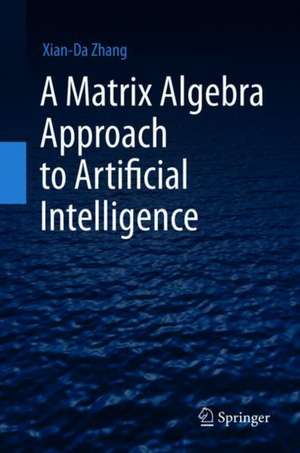A Matrix Algebra Approach to Artificial Intelligence
Autor Xian-Da Zhangen Limba Engleză Hardback – 23 mai 2020
The book consists of two parts: the first discusses the fundamentals of matrix algebra in detail, while the second focuses on the applications of matrix algebra approaches in AI. Highlighting matrix algebra in graph-based learning and embedding, network embedding, convolutional neural networks and Pareto optimization theory, and discussing recent topics and advances, the book offers a valuable resource for scientists, engineers, and graduate students in various disciplines, including, but not limited to, computer science, mathematics and engineering.
| Toate formatele și edițiile | Preț | Express |
|---|---|---|
| Paperback (1) | 1339.07 lei 38-44 zile | |
| Springer Nature Singapore – 23 mai 2021 | 1339.07 lei 38-44 zile | |
| Hardback (1) | 1330.96 lei 38-44 zile | |
| Springer Nature Singapore – 23 mai 2020 | 1330.96 lei 38-44 zile |
Preț: 1330.96 lei
Preț vechi: 1663.69 lei
-20% Nou
Puncte Express: 1996
Preț estimativ în valută:
254.71€ • 264.94$ • 210.28£
254.71€ • 264.94$ • 210.28£
Carte tipărită la comandă
Livrare economică 10-16 aprilie
Preluare comenzi: 021 569.72.76
Specificații
ISBN-13: 9789811527692
ISBN-10: 9811527695
Pagini: 820
Ilustrații: XXXIV, 820 p. 389 illus.
Dimensiuni: 155 x 235 mm
Greutate: 1.32 kg
Ediția:1st ed. 2020
Editura: Springer Nature Singapore
Colecția Springer
Locul publicării:Singapore, Singapore
ISBN-10: 9811527695
Pagini: 820
Ilustrații: XXXIV, 820 p. 389 illus.
Dimensiuni: 155 x 235 mm
Greutate: 1.32 kg
Ediția:1st ed. 2020
Editura: Springer Nature Singapore
Colecția Springer
Locul publicării:Singapore, Singapore
Cuprins
Part 1. Introduction to Matrix Algebra.- Chapter 1. Basic Matrix Computation.- Chapter 2. Matrix Differential.- Chapter 3. Gradient and Optimization.- Chapter 4. Solution of Linear Systems.- Chapter 5. Eigenvalue Decomposition.- Part 2. Artificial Intelligence.- Chapter 6. Machine Learning.- Chapter 7. Neural Networks.- Chapter 8. Support Vector Machines.- Chapter 9. Evolutionary Computation.
Recenzii
“The book is of very high relevance for students, professors and researchers involved in artificial intelligence (AI), the work is also of very high relevance for the mathematics community in general since it addresses the importance of matrix algebra for the field of AI and how major approaches and state-of-the-art algorithms rely on matrix algebra.” (Carlos Pedro Gonçalves, zbMATH 1455.68010, 2021)
Notă biografică
XIAN-DA ZHANG is a Professor Emeritus at the Department of Automation, Tsinghua University, China. He was a Distinguished Professor at Xidian University, Xi’an, China, as part of the Ministry of Education of China and Cheung Kong Scholars Programme, from 1999 to 2002. His areas of research include intelligent signal and information processing, pattern recognition, machine learning and neural networks, evolutional computation, and correlated applied mathematics. He has published over 120 international journal and conference papers. The Japanese translation of his book “Linear Algebra in Signal Processing” (published in Chinese by Science Press, Beijing, in 1997) was published by Morikita Press, Tokyo, in 2008. He also authored the book “Matrix Analysis and Applications” (Cambridge University Press, UK, 2017).
Textul de pe ultima copertă
Matrix algebra plays an important role in many core artificial intelligence (AI) areas, including machine learning, neural networks, support vector machines (SVMs) and evolutionary computation. This book offers a comprehensive and in-depth discussion of matrix algebra theory and methods for these four core areas of AI, while also approaching AI from a theoretical matrix algebra perspective.
The book consists of two parts: the first discusses the fundamentals of matrix algebra in detail, while the second focuses on the applications of matrix algebra approaches in AI. Highlighting matrix algebra in graph-based learning and embedding, network embedding, convolutional neural networks and Pareto optimization theory, and discussing recent topics and advances, the book offers a valuable resource for scientists, engineers, and graduate students in various disciplines, including, but not limited to, computer science, mathematics and engineering.
Caracteristici
Proposes the machine learning tree, the neural network tree and the evolutionary computation tree Presents the solid matrix algebra theory and methods for machine learning, neural networks, support vector machines and evolutionary computation Highlights selected topics and advances in machine learning, neural networks and evolutionary computation Summarizes about 80 AI algorithms so that readers can further understand and implement relevant AI methods
